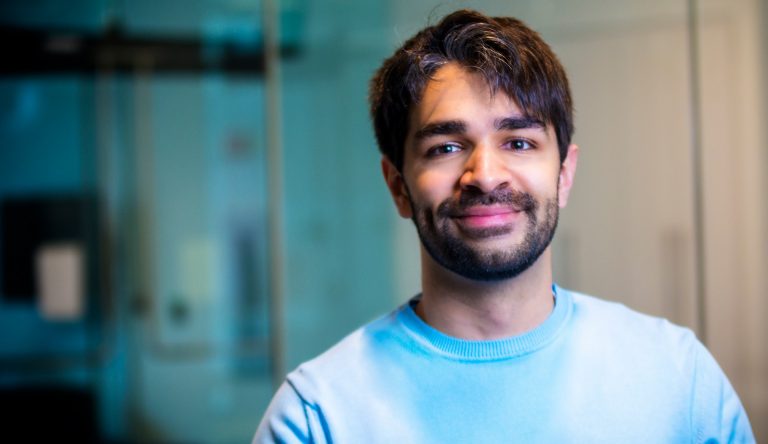Chemical engineering student tops Concordia’s Three Minute Thesis master’s competition

Every winter, GradProSkills hosts Concordia’s Three Minute Thesis (3MT) competition. Each hopeful is paired up with a team of mentors to help them create a three-minute pitch about their graduate-level research projects.
This year, the master’s heat was swept by students from the Gina Cody School of Engineering and Computer Science. Ameer Nizami placed first. He is halfway through his Master of Applied Science in Chemical Engineering and is supervised by Xia Li, assistant professor of chemical and materials engineering.
Nizami’s presentation, “A state-of-the-art coating,” was based on his thesis topic “Atomic layer deposition of nanomaterials of sulfur cathodes.” His research is housed in the Applied Science Hub on Concordia’s Loyola Campus.
‘Lithium sulfur is a candidate for next-generation battery technology’
Tell us about your research and why it’s important.
Ameer Nizami: I research lithium sulfur batteries. I think everyone is somewhat familiar with lithium-ion batteries. They’re in phones, laptops and electric vehicles.
But lithium sulfur uses what’s called a different active material. That’s the chemically active component that is transferred back and forth between charging and discharging cycles. Lithium sulfur is a candidate for next-generation battery technology. It will be able to store considerably more energy and has a significantly higher theoretical energy density.
What did the 3MT process help you with?
AN: The biggest thing I learned was how to effectively express a complex topic to the public. This took several drafts. I had at least three and a half iterations before I was certain that my audience would understand the concept I was describing.
And I learned how to look for cues. When we had our Zoom meetings with our coaches and the other competitors, as I would read my presentation, I would look at their facial expressions. “What are they thinking? What are their brows saying? Oh! This sounds too complicated.”
This experience got me out of my comfort zone — the laboratory — where I’m surrounded by those who are already in the field. It put me in front of people with diverse backgrounds, like in liberal arts.
Would you recommend the experience to your peers?
AN: All fields of research are dependent on funding. It’s essential to get the public to understand your research so they then push their government and industries to increase their investment in it. That’s what pushes policy-making in any country. To keep the gears of research turning, you have to effectively communicate with the general public.
This is definitely not the same as going to a research symposium and having other like-minded individuals listen to your topic. They already have hands-on research experience.
Here’s an example. This is what I learned about the word “insulating.”
Insulating, to me, in the context of batteries, means the electrons don’t want to move. They’re insulated. But insulating to somebody in the general public means insulation for heat. This is a separate phenomenon. We’re not getting into heating in winter. So, I thought, what’s a similar concept that people know that allows them to perceive insulation as I understand it?
Conductivity! I don’t want to say it’s a one to one, but it’s close enough: something that’s insulated has low conductivity. I had to make sure there was no confusion for my audience.
Do you have any tips for graduate students who are considering throwing their hats into the ring next year?
AN: I strongly recommend either recording yourself or having a friend listen to you at least once after making noticeable progress in your delivery.
The other key thing is a lot of people have hand gestures. The coaches will tell you if you have too many or too few. It’s key to have maybe one gesture that really ties in with your speech. For example, if you say, “Let me pull you back,” and you physically take a step back, it adds to your delivery of the presentation.
Also, if you don’t make the time to practice public speaking, you’ll never know how good you could be. I saw international students who struggled to speak English at the dry run who were considerably better at the final event. I was very impressed and proud to have seen them improve. I consider that just as important as winning.
Runner Up and People’s Choice winner Maryam Rezaei is pursuing a Master of Applied Science in Civil Engineering. She presented her research on “Bacteria can eat oil!” based on her thesis “Anerobic biodegradation of hydrocarbons by mature fine tailing indigenous bacteria.”
Learn more about Concordia’s Gina Cody School of Engineering and Computer Science.
Explore the Department of Chemical and Materials Engineering.
Learn more about GradProSkills.




